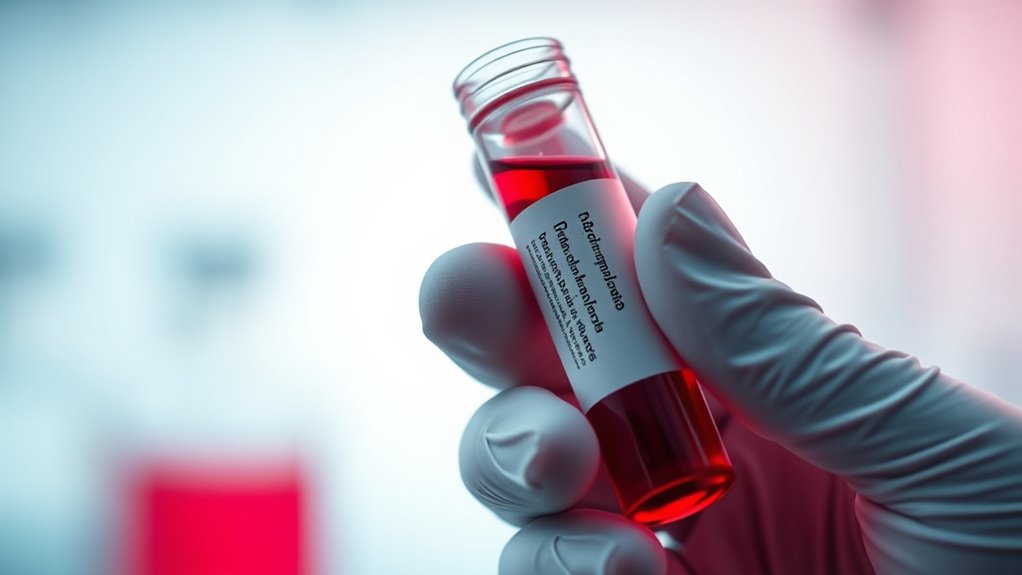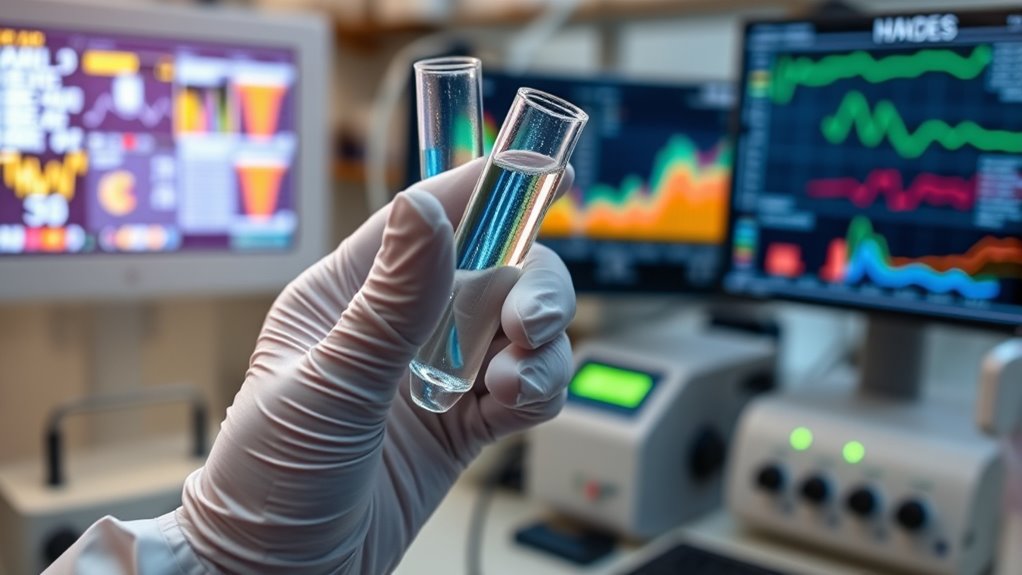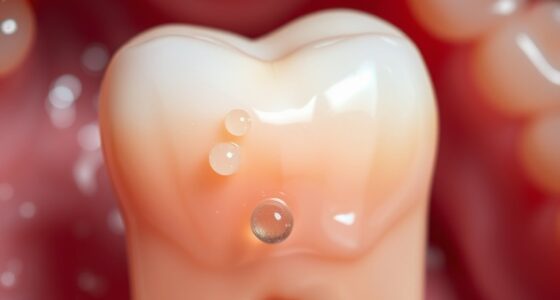A new blood test can detect multiple cancers early by analyzing circulating tumor DNA, offering a quick, minimally invasive way to identify cancer before symptoms appear. It allows for extensive screening and regular health monitoring, which could lead to earlier treatments and better survival chances. This innovative approach helps catch cancer sooner and reduces the need for aggressive therapies later. Keep exploring to discover how this breakthrough might impact your health and early cancer detection.
Key Takeaways
- The new blood test uses liquid biopsy technology to detect multiple cancer types early through genetic mutation analysis.
- It offers a minimally invasive, quick alternative to traditional biopsies, enabling more frequent health monitoring.
- Early detection allows for timely treatment, improving survival rates and reducing the need for aggressive therapies.
- The test can simultaneously screen for various cancers, providing a comprehensive health snapshot from a single blood sample.
- Ongoing research shows promising results, making cancer screening more accessible and potentially life-saving.

Researchers have developed a groundbreaking blood test that can detect multiple types of cancer at an early stage. This innovative approach, known as a liquid biopsy, allows you to identify cancer cells or their fragments circulating in your bloodstream long before symptoms appear. Early diagnosis is vital because catching cancer early substantially improves treatment options and survival rates. Unlike traditional biopsies that require invasive procedures, this blood test offers a quick, minimally invasive way to monitor your health regularly.
A new liquid biopsy detects multiple cancers early with a simple blood test, improving treatment outcomes and survival rates.
When you undergo this liquid biopsy, you simply provide a blood sample, which is then analyzed for genetic mutations, tumor DNA, or other markers associated with cancer. Because cancer releases tiny pieces of its DNA into your bloodstream early in its development, this test can detect cancers that might otherwise go unnoticed until they reach an advanced stage. This means you can potentially start treatment sooner, improving your prognosis and reducing the likelihood of aggressive therapies later on. Early detection is a key benefit that can dramatically change the outcome of cancer treatment.
The ability to screen for multiple cancers simultaneously makes this blood test particularly powerful. Instead of going through separate procedures for different types of cancer, you get a complete snapshot of your health. This is especially advantageous if you have risk factors or a family history that puts you at higher risk for various cancers. With regular testing, you can stay ahead of the disease, catching it in its earliest, most treatable form. Additionally, advances in genetic mutation analysis have enhanced the accuracy and reliability of detecting cancer-related markers in blood samples.
In addition to its benefits for early diagnosis, this blood test also helps in monitoring treatment effectiveness. If you’re already undergoing cancer therapy, it can reveal whether the treatment is working by tracking changes in the tumor DNA levels. This real-time feedback allows your healthcare team to adjust your treatment plan promptly, avoiding unnecessary side effects and optimizing outcomes.
While the technology is still advancing, early studies show promising results. It’s not meant to replace traditional diagnostic methods but to complement them, providing a more complete picture of your health. If adopted widely, this liquid biopsy could revolutionize cancer screening, making early detection more accessible and less invasive. It empowers you to take a proactive role in your health, potentially catching cancers before they become life-threatening.
Recent research indicates that genetic mutations can be effectively identified through circulating tumor DNA, enabling more precise detection and monitoring.
Frequently Asked Questions
How Accurate Is the New Blood Test Across Different Cancer Types?
You want to know how accurate the test is across different cancer types. The test sensitivity varies, but it generally offers high accuracy in cancer detection, especially for early-stage cancers. While it’s promising, keep in mind that performance may differ depending on the specific cancer. Overall, the test shows great potential for reliable detection, giving you a better chance for early intervention and improved outcomes.
What Is the Cost Comparison With Traditional Cancer Screening Methods?
You’ll find that the blood test offers a promising affordability comparison to traditional cancer screenings. While initial costs may vary, its cost effectiveness can reduce the need for multiple, invasive tests, saving money over time. This test’s simplicity and early detection potential could make it more accessible, especially in under-resourced areas. Overall, it aims to balance affordability with accurate, early diagnosis, improving patient outcomes and healthcare efficiency.
How Soon Can This Test Be Integrated Into Routine Medical Check-Ups?
While early adoption of new medical technology often faces hurdles, clinical implementation can happen quickly once proven effective. You might see this blood test integrated into routine check-ups within a few years, especially as research supports its accuracy and affordability. Its ease of use and potential to catch cancers early make it a promising candidate for widespread adoption, transforming standard screenings and saving countless lives.
Are There Any Known Risks or False Positives Associated With the Test?
You might wonder about the test risks and false positives with this new blood test. While it’s designed to detect multiple cancers early, false positives can occur, leading to unnecessary stress and follow-up procedures. Currently, researchers are working to minimize these risks, but no test is perfect. It’s important to discuss your concerns with your doctor, who can help interpret results and decide on the best course of action.
Will Insurance Cover This New Early Detection Blood Test?
Think of insurance coverage like a safety net, meant to catch you when you fall. Currently, health policy varies, and many plans may not yet cover this new early detection blood test. I know a friend who faced costly screenings, but insurance denied coverage. You should check with your provider to clarify coverage options. Staying informed helps you make the best decisions to protect your health and finances.
Conclusion
So, next time you’re worried about cancer sneaking up on you, just remember there’s now a blood test that might catch it before it even starts. Because who needs luck or good habits when you’ve got cutting-edge tech on your side? Just think—soon, you could be happily avoiding the gym and still get a clean bill of health. Cheers to science, making life easier—one tiny blood sample at a time!









